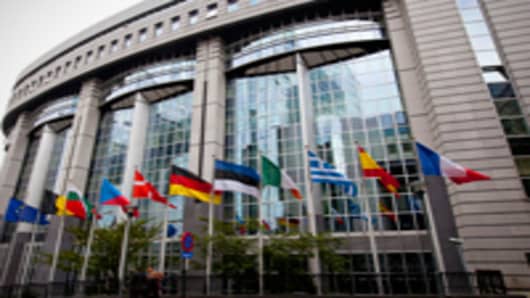Putting more capital into the banking system is not enough to solve Europe's financial problems or restore investor confidence, said the head of Germany's biggest bank.
"Just injecting capital to the banking system is certainly not sufficient because people will still have a lot of question marks about the debt sustainability of Greece, or contagion into other countries" including Italy and Spain, Deutsche Bank Chief Executive Josef Ackermann told CNBC Friday.
He said he's met with hundreds of investors in many parts of the world in the last few weeks and all are concerned about the Greek debt situation and want it contained so it won't affect other nations or what he called the "core banks."
He said the Greece situation is very different from that of Ireland, Portugal, Spain and Italy, which he said are doing much better.
"We now have to defend and clearly elaborate that [Greece] has been a unique situation and that in the other countries we are committed to service the debt. Greece has to be seen in a different context," he said. He supports Greece remaining in the European Union.
But Ackermann has long opposed raising capital requirements for European banks, and he told CNBC banks would face a competitive disadvantage as a result.
"In the fragile environment where we are getting close to zero growth in Europe we should do everything that banks can fulfill to lend money" and increase business rather than reducing lending or selling assets "to comply with a much higher capital ratio."
Still, he expects more European bank consolidations.
"We need a united Europe to have the size to compete with the U.S. and China and other major countries, and we need bigger banks to compete with the U.S. banks, the Chinese banks and many other banks in emerging economies," he said.
But before there is consolidation "we have to take away first uncertainties — regulatory uncertainties, fiscal uncertainties, the sovereign risk uncertainty. That’s why now we need very bold moves in Europe, and I’m confident we’re getting closer to a comprehensive package of what we have to do," which will be implemented in the next few years.
Ackermann stressed several times to CNBC his bank is strong and has no capital problems, and he downplayed Fitch Ratings' recent decision to place the bank's ratings on its Rating Watch Negative as part of a broader review of the world's largest banking institutions.
"We have good profitability," Ackermann said. "I don't think [the Fitch move] has any immediate impact."


